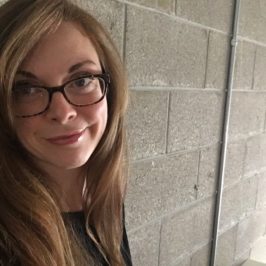Before Google, there were reference librarians. Post-Google, there are still reference librarians, because not everything you want to know is online, and even if it was it helps to have an expert guide you through it. As a freelancer accustomed to working from home, you might not feel comfortable asking a librarian for help, fearing that you are bothering them or that your question is too weird. (It isn’t.)
Throughout this Creative Research Series, we’ve covered four different ways to generate great research questions: research before you write, pick the whole orchard, enlist a junior research assistant, and be timeless. In this last installment, we’ll cover whom to talk to when you need answers to those questions.
Start at home

“One of the best questions you can ask is a how question…” Illustration by Josh Quick
Google cannot replace the services of a reference librarian, but asking an easily-googlable question can waste a librarian’s time. That’s why a useful conversation with a reference librarian starts at home, with your own research.
Before you seek the time and expertise of a librarian, make sure you have used the resources you already have. If you’re searching for news, start with a Google News search. If you’re searching for information from academic journals, Google Scholar and JSTOR are good starting points. For medical topics, try PubMed. For any topic, do a quick Google search for “how to research [topic]” to find freely-available resources.
Sometimes, the process of getting ready to ask your question will tell you how to answer it. But if you’ve listed every single thing you’ve tried to answer your question and still came up short, then it’s time to enlist your local librarians.
Ask a local librarian
Your public library probably has an “ask a librarian” feature. Check your library’s home page or about page for ways to connect with a local reference librarian. Your library may have a chat feature, which is great if you think you have a relatively simple, fact-based question but aren’t sure where to look for the answer. For longer, more complicated questions, you might consider using an email or phone service.
One of the best questions you can ask is a how question. In asking one, you’ll get help both with your specific question and with your future questions. “How many children’s cookbooks were published last year?” is a good question, but “How do I find publishing statistics for cookbooks, including how many children’s cookbooks were published last year?” is a great one. The first question will help you write one article. The second question will help you write many articles.
But don’t just stop with that great question. Your reference librarian will be better positioned to help answer your question if you’re more thorough about why you’re asking it. Explain the article you’re planning to write and what you’re planning to do with the answer you find. Describe any research you’ve already done to answer that question so that the librarian can help you broaden your search.
Ask the Library of Congress
If you don’t have a local library, or if that library does not have the resources you need, you may need a bigger library. Try the Library of Congress, which, despite its name, is limited neither to politicians or the physical building. Anyone in the world can use the LoC’s Ask a Librarian service.
As with your local reference librarian, you’ll get the best help if you describe your project, outline your research question, and explain where you’ve already looked for answers. You will also need patience, as your question may require a lot of detail to answer. According to the LoC’s Ask a Librarian video tutorial, you can expect an answer in about 5 business days, but if you’ve asked a stumper you may need to wait a bit longer.
From making good use of librarians to asking smart questions, research can take your freelance writing a long way. Find more great tips and earlier posts in this series on creative research here.

